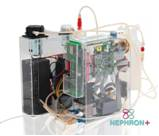Jun 25 2013
CEA-Leti and nine partners in the NEPHRON+ project are developing an artificial kidney that would provide a major improvement in treating patients with chronic kidney failure.
The goal is a next-generation, integrated system that allows real-time, continuous, multiparametric monitoring of the patient and the device via sensors developed by Leti and its partners. The continuous data collection will allow early detection of device anomalies and a trend analysis on the health status of the patient, which would be used to improve treatment.
The renal-care system, contained in a rectangular holder that is worn on the patient’s side, offers improved blood filtering and allows patients to avoid required periodic dialysis treatments.
“NEPHRON+ presents an ideal system for dialysis outside a hospital or clinic because it improves blood clearance and provides ongoing monitoring of the device and patients, who would gain a level of freedom and convenience they don’t have today,” said Gilles Marchand, head of Leti’s materials and interfaces chemistry laboratory “This system is another primary example of Leti’s continuing innovation in sensors and our commitment to turning technological advances into real products.”
 The artificial kidney developed by the consortium. Image courtesy of CEA-Leti.
The artificial kidney developed by the consortium. Image courtesy of CEA-Leti.
Leti’s contribution also will include the design, development and the integration of the electrochemical platform in the artificial kidney.
Leti focused on miniaturizing the sensors to embed them in the device, as well as improving the electronic board that converts the sensor electrical signals in a ready-to-use concentration. To achieve this, researchers developed an electrochemical platform including five biocompatible ionic selective electrodes (ISE) able to monitor ion concentrations, as well as a reference electrode, a temperature sensor and an EPROM to store parameters (calibration curves).
Leti’s partners in the project are Exodus S.A. (coordinator), CSEM, TNO, Nierstichting Nederland, IMST GmbH, Nanodialysis BV, Danube University Krems, University Medical Center Ultecht and OFFIS EV.
About CEA-Leti
Leti is an institute of CEA, a French research-and-technology organization with activities in energy, IT, healthcare, defence and security. Leti is focused on creating value and innovation through technology transfer to its industrial partners. It specializes in nanotechnologies and their applications, from wireless devices and systems, to biology, healthcare and photonics.
NEMS and MEMS are at the core of its activities. An anchor of the MINATEC campus, CEA-Leti operates 8,000-m² of state-of-the-art clean room space on 200mm and 300mm wafer platforms. It employs 1,700 scientists and engineers including 320 Ph.D. students and 200 assignees from partner companies. CEA-Leti owns more than 2,200 patent families.